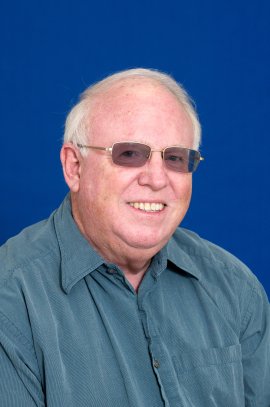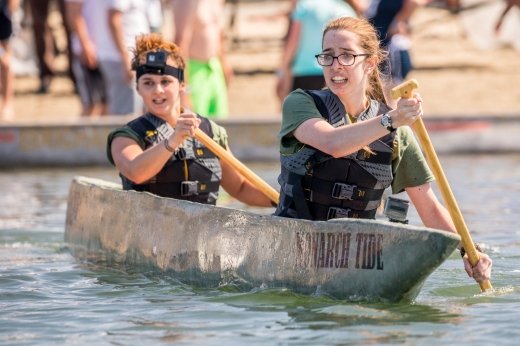By Sarah Huddle
Historically eschewed as slimy and gross, it turns out algae might be the solution to many of the most pressing environmental-sustainability issues.
The part of the economy that uses renewable biological resources such as algae to produce food, materials and energy is called the bioeconomy, a growing sector that has captured the interest of academia and major corporations and industry worldwide.
Cutting-edge research in the Batten College of Engineering and Technology at Old Dominion University is fueling the bioeconomy through the discovery of useful applications for algae as well as a proprietary process that can make these applications scalable for commercialization through partnerships with the private sector. The U.S. Department of Energy, Environmental Protection Agency and the National Science Foundation have funded research.
Patrick Hatcher, Batten Endowed chair of Physical Science Department of Chemistry and Biochemistry, and Sandeep Kumar, associate professor in the Department of Civil and Environmental Engineering and director of ODU's Energy Cluster, are at the forefront of this research which started at the University a decade ago. The goal then was to produce a biofuel from algae that could reduce oil dependence and minimize harmful emissions.
"We have been developing the technology to utilize algae as a good fuel source for a number of years and Old Dominion University holds several patents as a result," Hatcher said. "Our work also focuses on developing other parts of algae not used for fuel into high-value and economical chemicals."
A viable biofuel can be made from algae, Hatcher said, but interest in funding for further research has waned as political priorities have shifted and the cost of gas at the pump has dropped. As often occurs in research, the original work revealed exciting possibilities for additional algae applications.
According to Kumar, algae contain oil, which can be used for making biofuels. But they also contain proteins, which can be extracted from the oil and used as sustainable substitutes for petroleum-based fuels and chemicals.
"The problem we had to solve was how to extract the proteins from the algae in a scalable and inexpensive process to make it a viable resource for industrial use," Kumar said.
The National Science Foundation (NSF) awarded a research grant to Kumar in 2013 to develop a process utilizing flash hydrolysis to recover proteins, carbohydrates and lipids from algae oil. Then hydrothermal mineralization is used to recover inorganic nutrients for recycling.
The NSF awarded Kumar a second grant in 2016 to develop a pilot-scale mobile flash hydrolyzer unit to rapidly and economically harvest products made from micro-algae. Micro-algae have been on the forefront as an alternative feedstock to produce liquid transportation fuels, bioproducts and for wastewater treatment for nutrients recovery. The technology provides an economical way to harvest these products for commercialization.
Potential uses for the flash hydrolyzer include onsite algae processing at commercial algae cultivation facilities, recovery of bioproducts and nutrients at algae bloom sites, processing algae from the tertiary treatment of wastewater effluents and integration into a municipal solid-waste processing facility.
"Among the strengths we have at ODU is our ability to collaborate with businesses to bring technology to the marketplace that helps them succeed," Kumar said. "We welcome the opportunity."
For more information, please contact Hatcher at 757-683-6537 or phatcher@odu.edu or Kumar at 757-683-3898 or skumar@odu.edu.







